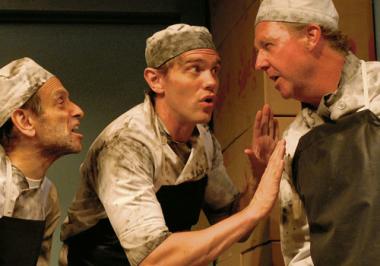Chester Theatre doesn't mess around when it comes to casting. Their actors tend to have extensive, impressive bios. That often makes a visit to what used to be called "the miniature theatre" worthwhile. In the case of Chester Theatre's current production, The Dishwashers, the formidable skill of the actors is the only thing keeping the play afloat. It may be, as Chester Theatre's literature says, that playwright Morris Panych is Canada's foremost playwright (his extensive credits indeed argue for such high praise). But if The Dishwashers is any indication, American playwrights should strap on snowshoes, because there are plenty of vacancies in the dramatic arts up north.
Despite valiant professionalism all around, The Dishwashers sinks under the weight of a script of epic ponderousness. For a drama, the play sports a decided lack of drama. The three main characters inhabit the basement of a restaurant and engage in endless rounds of the same set of tricks, never changing course, despite events.
Dressler (Tim Donoghue) is the boss of the washing room, a man who embraces his position with a near-infinite stream of pontificating. His sonorous philosophical musings are delivered with an expansive, convincing confidence; he is a true master of this circumscribed domain. Emmet (Jay Stratton) is "the new guy," a man who's arrived in the dishwashing world out of desperation and business failure. Though in the first scene his character seems cartoonish, Stratton brings the character to a solid sense of searching, to an insistence that Emmet not sink into resignation with his newfound status. Moss (Springfield native John Shuman) is an old, very ill dishwasher, a character whose timeless wretchedness might put him at home in a Beckett play. His laboriousness, given a red-eyed madness by Shuman, adds to the claustrophobia of The Dishwashers' troglodytic plight. Pelham resident Jeff Vatore plays a smaller role.
Dressler carries the most weight in the script, but never progresses beyond his blue-collar/highflown erudition, never loses his cool, and never confronts the fear of the restaurant world upstairs that seems to drive his talk, his spinning the lack of ambition into a noble ambition. Dressler's long-winded passages are often colorful in their metaphors, and mix the mildly amusing with a nearly poignant wide-angle view of the plight of the working man. Though the play has been praised as wildly funny, the preview night audience rarely rose above a murmuring chuckle, with the exception of a single guffawer whose riotous gales provided the surreal feel of a sitcom laugh-track.
The Dishwashers need not, however, be thought of as just a comedy, and what strengths it possesses lie in evoking the pathos of three intersecting lives, not in the stilted comic set-ups that hobble Panych's script through an insistence on over-repetition that diminishes returns. Throughout the play, for instance, characters deliver lines in the neighborhood of "I found that interesting," prompting a reply of, "You found that interesting?" The answer is, inevitably, "Not really." Mildly amusing once, certainly not endlessly droll.
As The Dishwashers groans to a conclusion, it becomes clear that Emmet, the character meant to bear the weight of change through his evolving social status, isn't really allowed by Panych to do much of anything; Emmet's wandering from high to low, from restaurant patron to dishwasher, simply remains ambivalent despite events, as if he almost changes, almost progresses, but instead leaves us (and the characters) exactly where we started emotionally.
Panych makes it hard to care deeply about these characters or their plight, though at his best, the playwright offers a chance at some pathos—Dressler keeps a secret to avoid hurting a co-worker, and Emmet often backs down uncomfortably when he strays toward insulting Dressler and Moss and their choice of profession. The potential for a sense of progression beyond such near-misses remains untapped. The lack of progress might, arguably, be the point, but unlike the stifling angst of a Beckett play, Panych's stasis is an uncompelling spectacle, unsalvageable even by these actors and director Byam Stevens, who clearly collaborated with considerable skill to bring out the most compelling aspects of Panych's characters. They seem stuck in their squalid basement, an enclosed universe (the play's only set) that references the outside, yet never gives the audience a chance to forge solidarity with the characters' struggles with that unseen world, even when unexpected turns finally affect the plot.
It seems unlikely that anyone's going to peruse a restaurant's dishes with newfound fervor, despite the play's best moments, when Dressler speaks humorously and eloquently of the role of his clean dishes, and how everything would unravel if a mere basil leaf made it onto someone's Rocket Salad plate. In the end, Panych wrote a play that doesn't seem confidently one thing or another. It is perhaps a farce with characters who are too complex for the lightness of farce, or a mildly humorous character study that doesn't leave his characters much room to grow. Even the spectacle of a character munching a carrot grown with the aid of human ashes, a moment fraught with potential to tap into something more interesting, comes across as merely gross, occasion for another momentary chuckle.
Donoghue, Stratton and Shuman were given scraps, and like their characters, who drink champagne from the bus trays, never neglect to sop up everything they can from these roles. That is certainly worth seeing as a study of acting and directing talent. It's too bad Panych never gives them more, never allows anything truly compelling to invade the world of The Dishwashers.
Through Aug. 10, $24.50-29.50, Chester Theatre, Chester Town Hall, (413) 354-7771.



